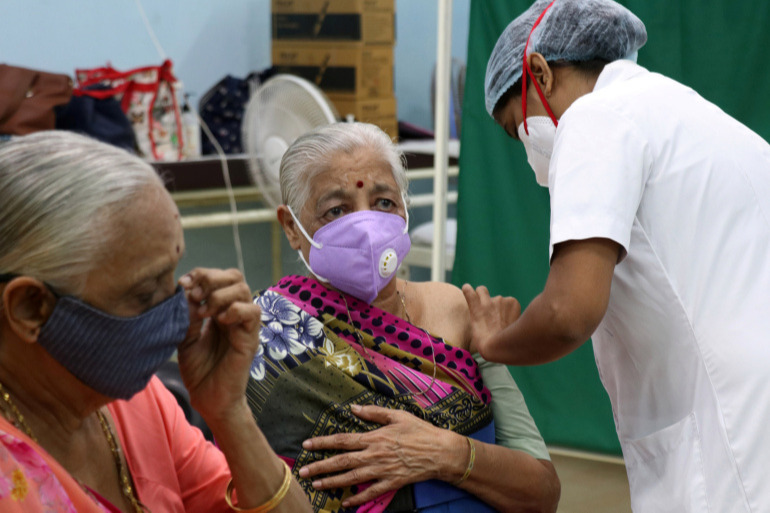
Spike in infections is India’s biggest crisis since Prime Minister Modi took office in 2014 [File: Niharika Kulkarni/Reuters]
New Delhi, May 2 (RHC)-- A forum of scientific advisers set up by the government warned Indian officials in early March of a new and more contagious variant of the coronavirus taking hold in the country, five scientists who are part of the forum told Reuters news agency.
Despite the warning, four of the scientists said the federal government did not seek to impose major restrictions to stop the spread of the COVID-19. Millions of largely unmasked people attended religious festivals and political rallies that were held by Prime Minister Narendra Modi, leaders of the ruling Bharatiya Janata Party, and opposition politicians. Tens of thousands of farmers, meanwhile, continued to camp on the edge of New Delhi protesting Modi’s agricultural policy changes.
The world’s second-most populous country is now struggling to contain a second wave of infections much more severe than its first last year, which some scientists say is being accelerated by the new variant and another variant first detected in Britain.
India on Saturday set yet another daily global record with 401,993 new coronavirus cases, taking its tally to more than 19.1 million. Another 3,523 people died in the past 24 hours, raising the overall fatalities to 211,853, according to the health ministry.
The spike in infections is India’s biggest crisis since Modi took office in 2014. It remains to be seen how his handling of it might affect Modi or his party politically. The next general election is in 2024. Voting in the most recent local elections was largely completed before the scale of the new surge in infections became apparent.
The warning about the new variant in early March was issued by the Indian SARS-CoV-2 Genetics Consortium, or INSACOG. It was conveyed to a top official who reports directly to the prime minister, according to one of the scientists, the director of a research centre in northern India who spoke on condition of anonymity. Reuters could not determine whether the INSACOG findings were passed on to Modi himself.
INSACOG was set up as a forum of scientific advisers by the government in late December specifically to detect genomic variants of the coronavirus that might threaten public health. INSACOG brings together 10 national laboratories capable of studying virus variants.
INSACOG researchers first detected B.1.617, which is now known as the Indian variant of the virus, as early as February, said Ajay Parida, director of the state-run Institute of Life Sciences and a member of INSACOG.
INSACOG shared its findings with the health ministry’s National Centre for Disease Control (NCDC) before March 10, warning infections could quickly increase in parts of the country, the director of the northern India research centre said. The findings were then passed on to the Indian health ministry, this person said. The health ministry did not respond to requests for comment.
Around that date, INSACOG began to prepare a draft media statement for the health ministry. A version of that draft, seen by Reuters, set out the forum’s findings: the new Indian variant had two significant mutations to the portion of the virus that attaches to human cells, and it had been traced in 15 percent to 20 percent of samples from Maharashtra, India’s worst-affected state.
The draft statement said the mutations, called E484Q and L452R, were of “high concern”. It said “there is data of E484Q mutant viruses escaping highly neutralising antibodies in cultures, and there is data that L452R mutation was responsible for both increased transmissibility and immune escape”.
In other words, essentially, this meant that mutated versions of the virus could more easily enter a human cell and counter a person’s immune response to it.
The ministry made the findings public about two weeks later, on March 24, when it issued a statement to the media that did not include the words “high concern.” The statement said only that more problematic variants required following measures already under way – increased testing and quarantine. Testing has since nearly doubled to 1.9 million tests a day.
Asked why the government did not respond more forcefully to the findings, for example by restricting large gatherings, Shahid Jameel, chair of the scientific advisory group of INSACOG, said he was concerned that authorities were not paying enough attention to the evidence as they set policy.
“Policy has to be based on evidence and not the other way around,” he said. “I am worried that science was not taken into account to drive policy. But I know where my jurisdiction stops. As scientists we provide the evidence, policymaking is the job of the government.”
Parida said the draft media release was sent to the most senior bureaucrat in the country, Cabinet Secretary Rajiv Gauba, who reports directly to the prime minister. Reuters was unable to learn whether Modi or his office were informed of the findings. Gauba did not respond to a request for comment.
The government took no steps to prevent gatherings that might hasten the spread of the new variant, as new infections quadrupled by April 1 from a month earlier. Modi, some of his top lieutenants, and dozens of other politicians, including opposition figures, held rallies across the country for local elections throughout March and into April.
The government also allowed the weeks-long Kumbh Mela religious festival, attended by millions of Hindus, to proceed from mid-March.
Meanwhile, tens of thousands of farmers were allowed to remain camped on the outskirts of the capital New Delhi to protest against new agriculture laws.
To be sure, some scientists say the surge was much larger than expected and the setback cannot be pinned on political leadership alone. “There is no point blaming the government,” Saumitra Das, director of the National Institute of Biomedical Genomics, which is part of INSACOG, told Reuters.

